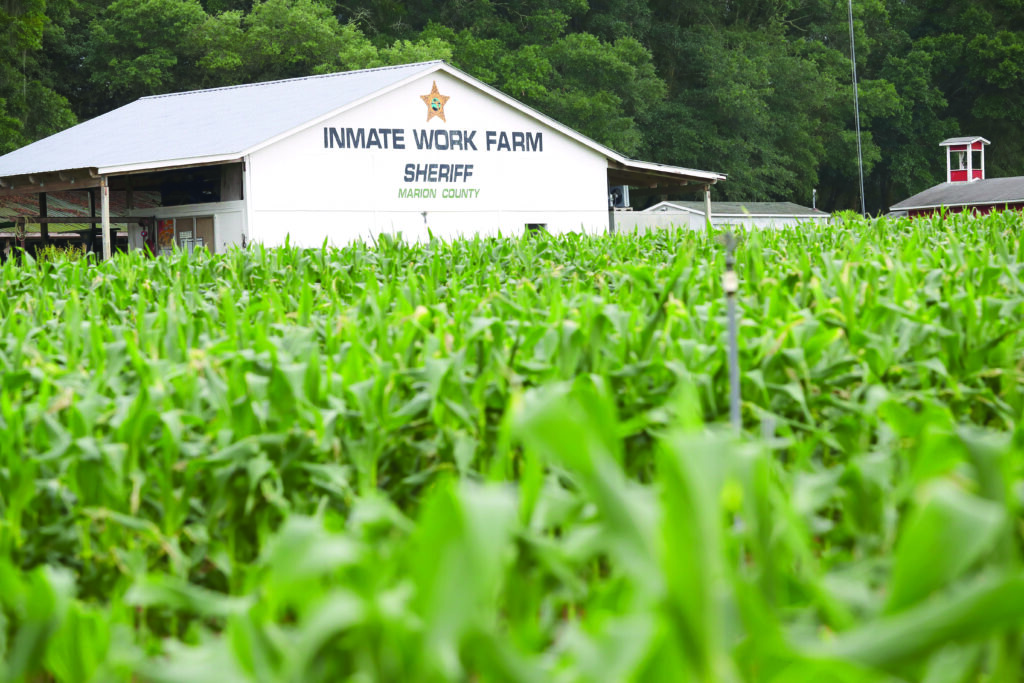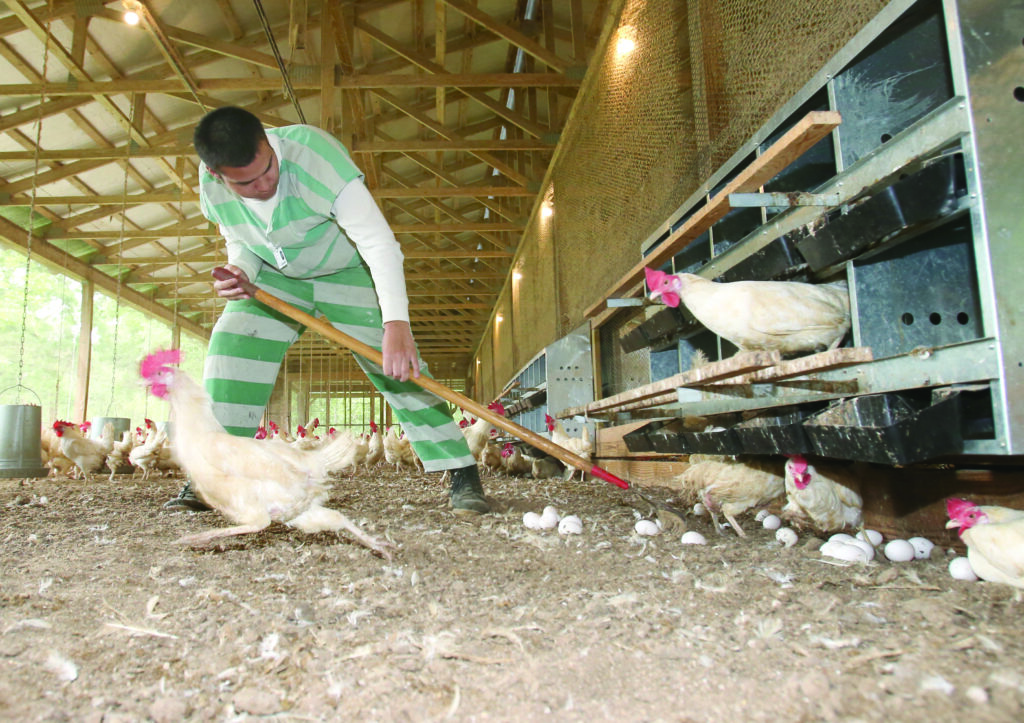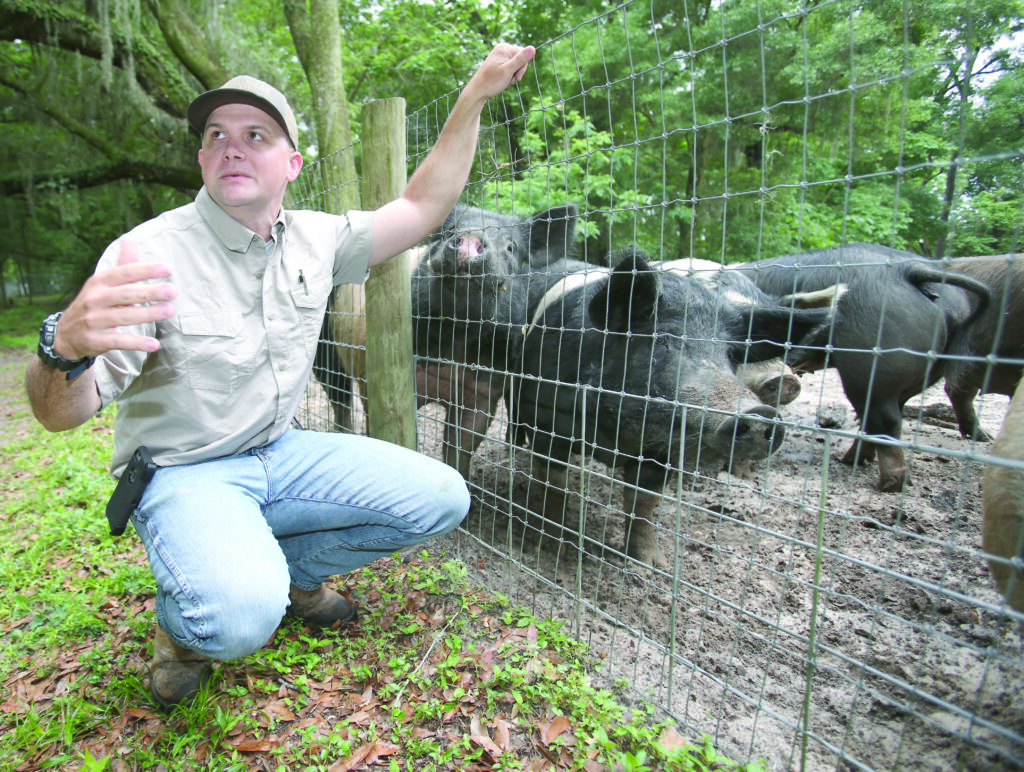Marion County’s inmate farm its own bumper crop

[Bruce Ackerman/Ocala Gazette]

You’d be hard pressed to find a meal for 60 cents.
But there are times during peak growing season when meals at the Marion County jail can cost just that, thanks to the crops and livestock raised at the Marion County Sheriff’s Office Inmate Work Farm.
With inmate meal prices at other institutions around the state and country costing upwards of $3 per meal, the savings add up to serious scratch considering the nearly 5,000 meals Marion County serves every day.
Located on 54 acres at the corner of Maricamp and Baseline roads, the farm started more than 20 years ago under Sheriff Ed Dean. Since that time, it has proved a money saver for Marion County’s taxpayers, while providing several benefits for inmates who work the farm.
The farm produces squash, zucchini, sweet corn, cabbage, green beans and peanuts in the spring. In the fall, the rotation includes sweet potatoes and turnip greens.
Those who volunteer to work on the farm can attend classes on row crop production, which teaches them the basics of soil science. They also have to complete a worker’s protection course required by federal law for those who work in fields treated with pesticides.
Upon completion of the course inmates earn a certificate, which is valid for a year and can be used for other agricultural jobs once released.
“The bonus here is that schoolhouse,” said Sgt. Paul Bloom of the sheriff’s office. “These guys go in there and learn something. These guys have never done anything like this in their life. It’s all new to them.”
According to Bloom, some released inmates have left the work farm and started a garden at home.

Joell Fincher collects eggs inside the hen house. [Bruce Ackerman/Ocala Gazette]
The farm is home to more than 2,000 chickens at any given time.
Currently, only one of the farm’s two chicken houses is in use and is home to about 2,000 Rhode Island Whites, which produce about 1,000 eggs a day.
One inmate worker mans the chicken house, keeping it clean and collecting eggs. But the job isn’t for everyone, said Sgt. Evan Land, who supervises the work farm.
Some inmates are scared of the chickens, he said.
“I ain’t working in the chicken house,” Land said inmates tell him.
As eggs are collected, they’re taken to a washing station where they’re bleached, washed and stored in a cooler until they’re taken to the jail.
Robert Henry calls himself a “professional egg-washer” after three months of working on the farm.
Henry was booked in December and won’t be released until late May. But he’s thankful for his time on the farm.
“It’s better than sitting in there all day,” Henry said of the jail. “Makes the days go by faster.”
When Henry stumbles across cracked eggs, he sets them aside to help feed the 35 hogs that also live on the farm.
On top of rejected eggs, the pigs eat the inmates’ leftovers.
Black, 400-pound barrels containing leftovers from the day before are brought to the farm,

Sgt. Evan Land describes how hogs are raised. [Bruce Ackerman/Ocala Gazette]
where the food scraps are heated over a fire each morning, killing the bacteria before being fed to the swine.
“Nothing is wasted,” Land said.
Hogs are raised on the farm until they are ready for slaughter.
The sheriff’s office has a partnership with the Manatee County Sheriff’s Office, which has a similar work farm. Manatee County can process meat at its facility in Bradenton, giving Marion County a cost-effective way to have its livestock slaughtered and prepared for the kitchen.
The work farm also raises cattle, some of which go to feed inmates. Others are sold at market every October. Proceeds from the sales go to the county commission, which often give it back to the sheriff’s office.
The cattle processed for inmate meals is all ground into hamburger.
“We’re not cutting filets off of them or anything. Everything is ground,” Bloom said. “The hamburgers over there? It’s the whole cow. T-bone, filet… all that meat is ground. So, the hamburgers at the jail are pretty good.”
Keeping costs low has caught the attention of other law enforcement agencies.
According to Land, the Putnam County Sheriff’s Office plans a tour of the local farm.
And Marion County is eyeing new property.
Anywhere from 50 to 60 of the farm’s cows are kept on grazing land near the Ocala International Airport on property leased from Ocala. Because of increased development in the area, the sheriff is looking for additional grazing land.
Overall, the farm has proven a wise investment for both the taxpayers and inmates.
“It was a good vision that (Dean) had,” Bloom said. “It’s saved the taxpayers so much money. Every year we look at it, but it’s in the millions of dollars that are saved by what we’re able to do here.”
Featured Local Savings
Support community journalism
The first goal of the Ocala Gazette is to deliver trustworthy local journalism so corruption, misinformation and abuse are not hidden from the public or unchallenged.




